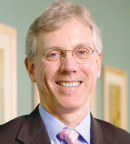This summer, ASCO continued its active involvement in Vice President Joe Biden’s Cancer Moonshot Initiative. ASCO joined the Vice President at the formal launch of the moonshot earlier this year, and since then, has discussed research and policy proposals to advance discovery in cancer treatment with his office, as well as the importance of big data initiatives, such as CancerLinQ™—ASCO’s big data, rapid-learning system deployed in oncology practices across the United States— to improve the quality of care for people with cancer.
ASCO Leaders Participate in Cancer Moonshot Summit

Clifford A. Hudis, MD, FACP, FASCO

Kevin Fitzpatrick
ASCO CEO Clifford A. Hudis, MD, FACP, FASCO, and CancerLinQ LLC CEO Kevin Fitzpatrick attended Vice President Biden’s Cancer Moonshot Summit at Howard University this June, where they joined leaders and stakeholders across the cancer research and care spectrum. During the summit, participants met in breakout sessions to discuss practical steps for the Vice President to pursue to help accelerate progress. Dr. Hudis served as a discussion leader in an afternoon breakout session focused on streamlining all aspects of the regulatory process.

Richard Pazdur, MD, FACP
In conjunction with this landmark gathering of cancer community stakeholders, the Vice President made multiple notable announcements, including the selection of Richard Pazdur, MD, FACP, to lead the agency’s new Oncology Center of Excellence—an appointment that ASCO applauds—and the selection of nearly 200 physician group practices and 17 health insurance companies to participate in the Oncology Care Model, a cancer care payment and service delivery model developed by the Center for Medicare & Medicaid Innovation.
ASCO Submits Recommendations to National Cancer Moonshot Initiative
As part of its ongoing work with the National Cancer Moonshot initiative, ASCO also submitted recommendations on how the National Cancer Institute (NCI) should engage in the Obama Administration’s Cancer Moonshot Initiative. Earlier this year, the NCI launched an online platform for the biomedical community, patients, and the general public to share ideas to improve cancer research and double the pace of progress against cancer.

Daniel F. Hayes, MD, FACP, FASCO
In a comment letter to the NCI Blue Ribbon Panel, a working group of the presidentially appointed NCI National Cancer Advisory Board, ASCO President Daniel F. Hayes, MD, FACP, FASCO, urged the panel to leverage innovative advances in technology that will provide game-changing platforms and alter the trajectory of cancer research, especially emphasizing the following three areas:
- Enhanced access to clinical outcomes databases, like ASCO’s CancerLinQ, to help learn from all cancer patients throughout the cancer continuum.
- A sustained and well-funded national cancer research system and a clinical research infrastructure that brings trials to patients as they are identified at the point of care, the way ASCO’s Targeted Agent and Profiling Utilization Registry (TAPUR) study is designed to do.
- Use of digital technology and mobile devices to better incorporate patient-reported outcomes tools into clinical trials and ensure that researchers collect outcomes that are meaningful to patient selection of therapy.
In a separate letter, ASCO also provided the Vice President’s office with some examples of immediate actions the Administration can take to rapidly accelerate the pace of cancer research and improve the lives of cancer patients and survivors immediately and indefinitely.
Vice President Joe Biden Addresses ASCO Annual Meeting
ASCO’s recommendations come on the heels of Vice President Biden’s address at the 2016 ASCO Annual Meeting. The Vice President thanked oncologists for their commitment to patient care and their contributions to the nation’s growing understanding of cancer and called on them to provide bold new ideas that can advance the National Cancer Moonshot Initiative.
“Every year, thousands of oncologists and millions of patients all over the world await the news coming from this meeting—new breakthroughs, new therapies, new promises of cure, hope,” the Vice President said. “I know of no cadre of people in the world more desperately in need of hope than the 16 million people with cancer.”
Additional ASCO recommendations addressed the following research needs:
- Population-wide implementation of evidence-based cancer prevention;
- Clinical trial accrual and the representativeness of research participants;
- Research to guide effective survivorship care;
- Patient-reported outcomes and additional types of toxicity assessments for measuring effectiveness and harms of cancer treatments;
- Incorporating real-world evidence to enable learning from every cancer patient;
- Development and validation of biomarkers;
- Determining effective ways to improve processes associated with conducting and managing clinical trials; and
- Dissemination and implementation research on cancer care delivery.
ASCO continues to actively support the Vice President’s Cancer Moonshot Initiative and advocate for research and policy changes that will accelerate the development of groundbreaking clinical research and the most promising treatments in patient care.
To stay updated on ASCO’s participation in the National Cancer Moonshot initiative, please visit ascoaction.asco.org. ■
© 2016. American Society of Clinical Oncology. All rights reserved.

